Don't wanna be here? Send us removal request.
Text
Learn Safety and Earn Your Safety Officer Certification: Build a Safer Future Today
In every industry, safety is not just a legal obligation—it's a core value. As organizations place more emphasis on creating secure and compliant workplaces, the demand for qualified safety officers continues to rise. Our “Learn Safety and Earn Your Safety Officer Certification” program is designed to equip you with the skills, confidence, and credentials needed to take charge of workplace safety and compliance.
Why Become a Certified Safety Officer?
A Safety Officer plays a vital role in minimizing risks, preventing incidents, and ensuring adherence to health and safety regulations. Earning your certification demonstrates your commitment to workplace wellbeing and opens the door to rewarding career opportunities across sectors such as construction, manufacturing, oil & gas, healthcare, logistics, and more.
What You’ll Learn
This program blends theoretical knowledge with practical insights, enabling you to:
Understand Core Safety Principles: Learn about hazard identification, risk assessment, safety audits, and regulatory frameworks.
Implement Safety Protocols: Gain hands-on skills in creating safety
Safety course in chennai
Safety course in madurai Safety course in chennai

0 notes
Text
Enhance Your Career with Our Industry-Recognized Safety Training
In today's competitive job market, having professional qualifications isn't just an advantage—it's essential. If you're looking to advance your career in high-demand fields like construction, oil & gas, manufacturing, or logistics, industry-recognized safety training can be your key to success.
Why Safety Training Matters
Workplace safety is a top priority for employers across sectors. Organizations are constantly on the lookout for qualified professionals who can manage risks, ensure compliance, and protect people and property. By completing accredited safety training, you position yourself as a valuable asset with specialized skills.
Benefits of Industry-Recognized Safety Certifications:
✅ Higher Employability
✅ Better Salary Prospects
✅ Career Advancement Opportunities
✅ Global Job Recognition
✅ Improved Workplace Confidence
Our Top Safety Courses
We offer a wide range of safety programs tailored for both beginners and experienced professionals:
1. NEBOSH International General Certificate (IGC)
One of the most respected qualifications for those seeking roles in health and safety.
2. IOSH Managing Safely
Perfect for team leaders and managers aiming to implement safe systems of work.
3. OSHA 10-Hour and 30-Hour Certification
Essential for professionals working in industries with U.S. safety standards.
4. Diploma in Industrial Safety
Covers all aspects of industrial hazard control and risk management.
5. Fire and Safety Course
Train in fire prevention, emergency response, and first-aid procedures.
6. Advanced Offshore & Rig Safety Training
Specialized training for those working in high-risk oil, gas, and offshore sectors.
Why Train with Us?
🎓 Accredited Programs – Globally accepted certifications
👨🏫 Expert Trainers – Real-world industry experience
🏢 Modern Facilities – Hands-on training in state-of-the-art classrooms
💼 Job Assistance – Placement support with top safety recruiters
🕒 Flexible Batches – Weekday & weekend classes available
Start Your Journey Today!
Don’t just settle for a job—build a career that matters. Enroll in our industry-recognized safety training programs and take your professional journey to the next level.
👉 Contact us now to enroll or speak with a career counselor!
📍Training available in Chennai and other major cities
Safety course in chennai Safety course in chennai Nebosh course in chennai

0 notes
Text
Full Stack Web Development Bootcamp: Frontend & Backend Skills in Chennai
Chennai is emerging as a top destination for tech talent, making it the perfect place to dive into web development. If you’re looking to become a versatile web developer, mastering both frontend and backend skills is essential. A Full Stack Web Development Bootcamp in Chennai can help you gain the knowledge, experience, and portfolio needed to thrive in today’s competitive tech industry.
What is Full Stack Web Development?
Full Stack Web Development covers the entire scope of web application development, including:
Frontend Development: The client-facing side that users see and interact with.
Backend Development: The server-side logic, databases, and APIs that power the application.
Mastering both areas enables developers to create complete web applications and manage every stage of the development process.
Why Enroll in a Full Stack Bootcamp in Chennai?
Growing IT Hub: Chennai is home to leading tech companies, creating abundant job opportunities.
Hands-on Training: Bootcamps focus on practical learning through real-world projects.
Networking: You’ll be part of Chennai’s vibrant tech community, offering opportunities to connect with industry leaders.
Job Placement Support: Bootcamps often provide career services like resume reviews and interview preparation to help you land a job.
Key Skills Covered in a Full Stack Web Development Bootcamp
Frontend Development
HTML/CSS: Learn to build and style web pages.
JavaScript: Add interactivity to websites.
Frameworks: Use popular tools like React or Vue.js for efficient development.
Backend Development
Node.js: Create server-side applications using JavaScript.
Express.js: Build RESTful APIs to connect the frontend to the backend.
Databases: Work with MySQL, PostgreSQL, or MongoDB to store and manage data.
Version Control & Deployment
Git/GitHub: Track code changes and collaborate with others.
CI/CD: Automate code testing and deployment.
Cloud Deployment: Deploy applications to platforms like AWS or Heroku.
Bootcamp Features to Look Out For
Mentorship: Guidance from experienced web developers.
Capstone Projects: Hands-on projects to build your portfolio.
Career Support: Resume building, mock interviews, and job placement assistance.
Chennai: The Perfect Place for Your Coding Journey
Chennai’s rapidly expanding tech scene makes it a great location for a Full Stack Web Development Bootcamp. With growing job opportunities and access to a supportive developer community, this is your chance to build a strong foundation for your career in web development.
Fullstack course in chennai
Fullstack developer course in chennai
Fullstack training in chennai

0 notes
Text
Core Topics Covered in a Full Stack Developer Course

Highlight the Main Modules or Sections of the Course
Break down a typical full stack course curriculum. This gives readers a concrete idea of what they'll learn and assures them the course will prepare them comprehensively.
Suggested Modules:
Foundations of Web Development: HTML, CSS, and JavaScript basics.
Front-End Frameworks: Popular frameworks like React, Angular, or Vue.
Back-End Development: Server-side programming with Node.js, Python, or PHP.
Database Management: Relational and non-relational databases.
Version Control with Git: Collaborative coding and version tracking.
Project Building: Capstone projects, full-stack applications.
Deployment and DevOps Basics: Hosting, deploying applications, using cloud services.
Fullstack developer course in chennai
Full stack course in chennai
Full stack training in chennai
0 notes
Text
Full Stack Web Development Bootcamp: Frontend & Backend Skills in Chennai
Chennai is emerging as a top destination for tech talent, making it the perfect place to dive into web development. If you’re looking to become a versatile web developer, mastering both frontend and backend skills is essential. A Full Stack Web Development Bootcamp in Chennai can help you gain the knowledge, experience, and portfolio needed to thrive in today’s competitive tech industry.
What is Full Stack Web Development?
Full Stack Web Development covers the entire scope of web application development, including:
Frontend Development: The client-facing side that users see and interact with.
Backend Development: The server-side logic, databases, and APIs that power the application.
Mastering both areas enables developers to create complete web applications and manage every stage of the development process.
Why Enroll in a Full Stack Bootcamp in Chennai?
Growing IT Hub: Chennai is home to leading tech companies, creating abundant job opportunities.
Hands-on Training: Bootcamps focus on practical learning through real-world projects.
Networking: You’ll be part of Chennai’s vibrant tech community, offering opportunities to connect with industry leaders.
Job Placement Support: Bootcamps often provide career services like resume reviews and interview preparation to help you land a job.
Key Skills Covered in a Full Stack Web Development Bootcamp
Frontend Development
HTML/CSS: Learn to build and style web pages.
JavaScript: Add interactivity to websites.
Frameworks: Use popular tools like React or Vue.js for efficient development.
Backend Development
Node.js: Create server-side applications using JavaScript.
Express.js: Build RESTful APIs to connect the frontend to the backend.
Databases: Work with MySQL, PostgreSQL, or MongoDB to store and manage data.
Version Control & Deployment
Git/GitHub: Track code changes and collaborate with others.
CI/CD: Automate code testing and deployment.
Cloud Deployment: Deploy applications to platforms like AWS or Heroku.
Bootcamp Features to Look Out For
Mentorship: Guidance from experienced web developers.
Capstone Projects: Hands-on projects to build your portfolio.
Career Support: Resume building, mock interviews, and job placement assistance.
Chennai: The Perfect Place for Your Coding Journey
Chennai’s rapidly expanding tech scene makes it a great location for a Full Stack Web Development Bootcamp. With growing job opportunities and access to a supportive developer community, this is your chance to build a strong foundation for your career in web development.
Fullstack course in chennai
Fullstack developer course in chennai
Fullstack training in chennai

0 notes
Text
Master Full Stack Development with 100% Placement Assurance
Are you looking to kickstart a rewarding career in the tech industry? Full Stack Development is one of the most in-demand skills in the software industry today. With businesses increasingly relying on digital solutions, the demand for skilled Full Stack Developers continues to grow. Our Full Stack Development training program offers hands-on experience, expert guidance, and 100% placement assurance to help you secure a promising career in the IT field.
Why Choose Full Stack Development?
Full Stack Development involves working with both front-end and back-end technologies, making it a versatile and highly sought-after skill set. Here’s why you should consider becoming a Full Stack Developer:
High Demand – Companies are actively seeking professionals with Full Stack Development expertise.
Lucrative Salary – Full Stack Developers earn competitive salaries worldwide.
Diverse Career Opportunities – Work in startups, MNCs, or as a freelancer.
Complete Skillset – Gain knowledge in front-end, back-end, databases, and deployment.
What Our Training Program Offers
Our Full Stack Development training program is designed to equip you with job-ready skills. Here’s what you get:
1. Comprehensive Curriculum
Front-End Technologies: HTML, CSS, JavaScript, React.js
Back-End Technologies: Node.js, Express.js
Database Management: MongoDB, MySQL
Version Control: Git, GitHub
Deployment & Cloud Technologies: AWS, Firebase
2. Hands-On Projects
Gain practical experience by working on real-world projects that enhance your portfolio and showcase your skills to potential employers.
3. Expert Mentorship
Learn from industry experts with years of experience in Full Stack Development. Get guidance, support, and insights into industry trends.
4. Placement Assistance
We provide 100% placement assurance, including:
Resume building and interview preparation
Mock interviews with industry professionals
Job referrals and networking opportunities
5. Modern Infrastructure
Our institute offers state-of-the-art classrooms with modern infrastructure to ensure an immersive and productive learning experience.
Who Can Join This Course?
Our Full Stack Development training is suitable for:
Fresh graduates looking to enter the IT industry
Working professionals aiming for a career transition
Entrepreneurs wanting to develop their own web applications
Anyone passionate about coding and software development
Enroll Today & Secure Your Future!
Take the first step toward a successful career in Full Stack Development. Join our training program and get placed in top IT companies with 100% placement assurance.
For more details, contact us today!
Fullstack course in chennai
Fullstack developer course in chennai
Fullstack training in chennai

0 notes
Text
What is important to learn in web development?
1. Front-End Development (Client-Side)
HTML – The foundation of web pages.
CSS – Styling for layout, colors, and animations.
JavaScript – Adds interactivity and functionality.
Front-End Frameworks/Libraries:
React.js (Popular for modern web apps)
Vue.js or Angular (Alternatives to React)
Responsive Design – Ensuring websites work on all devices.
Version Control (Git/GitHub) – Tracking code changes.
2. Back-End Development (Server-Side)
Programming Languages:
JavaScript (Node.js)
Python (Django, Flask)
PHP (Laravel)
Java (Spring Boot)
Databases:
SQL (MySQL, PostgreSQL)
NoSQL (MongoDB, Firebase)
Authentication & Security:
JWT, OAuth, or session-based authentication.
Secure coding practices (preventing SQL Injection, XSS, etc.).
APIs:
RESTful APIs & GraphQL.
3. Full-Stack Development
Combining front-end and back-end skills.
Working with full-stack frameworks like MERN (MongoDB, Express.js, React, Node.js) or MEVN (Vue instead of React).
4. DevOps & Deployment
Hosting & Deployment:
Platforms like Netlify, Vercel, Firebase for front-end.
AWS, DigitalOcean, or Heroku for back-end.
Docker & Kubernetes – For scalable applications.
CI/CD (Continuous Integration/Continuous Deployment) – Automating code deployment.
5. Soft Skills & Best Practices
Problem-solving & debugging.
Understanding UX/UI principles.
Writing clean, maintainable code.
Working with Agile methodologies.
Since you’re associated with a Full Stack Development training institute, these topics can help shape your course offerings or promotional content.
Fullstack course in chennai
Fullstack developer course in chennai
Fullstack training in chennai
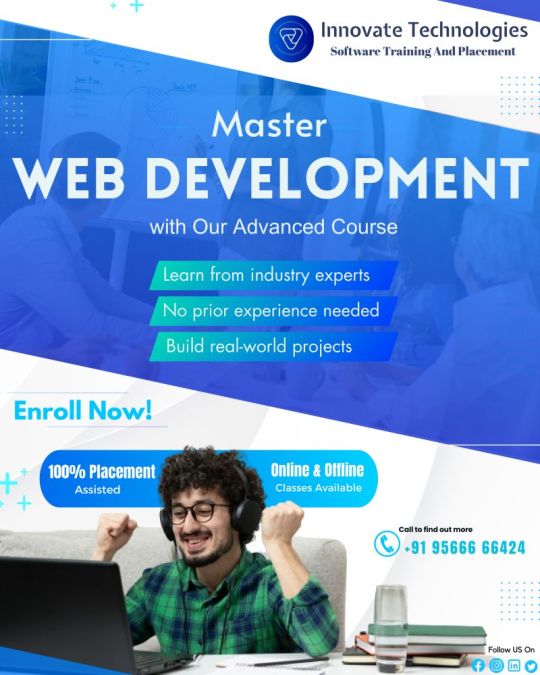
0 notes
Text
Master Full Stack Development with 100% Placement Assurance
Are you looking to kickstart a rewarding career in the tech industry? Full Stack Development is one of the most in-demand skills in the software industry today. With businesses increasingly relying on digital solutions, the demand for skilled Full Stack Developers continues to grow. Our Full Stack Development training program offers hands-on experience, expert guidance, and 100% placement assurance to help you secure a promising career in the IT field.
Why Choose Full Stack Development?
Full Stack Development involves working with both front-end and back-end technologies, making it a versatile and highly sought-after skill set. Here’s why you should consider becoming a Full Stack Developer:
High Demand – Companies are actively seeking professionals with Full Stack Development expertise.
Lucrative Salary – Full Stack Developers earn competitive salaries worldwide.
Diverse Career Opportunities – Work in startups, MNCs, or as a freelancer.
Complete Skillset – Gain knowledge in front-end, back-end, databases, and deployment.
What Our Training Program Offers
Our Full Stack Development training program is designed to equip you with job-ready skills. Here’s what you get:
1. Comprehensive Curriculum
Front-End Technologies: HTML, CSS, JavaScript, React.js
Back-End Technologies: Node.js, Express.js
Database Management: MongoDB, MySQL
Version Control: Git, GitHub
Deployment & Cloud Technologies: AWS, Firebase
2. Hands-On Projects
Gain practical experience by working on real-world projects that enhance your portfolio and showcase your skills to potential employers.
3. Expert Mentorship
Learn from industry experts with years of experience in Full Stack Development. Get guidance, support, and insights into industry trends.
4. Placement Assistance
We provide 100% placement assurance, including:
Resume building and interview preparation
Mock interviews with industry professionals
Job referrals and networking opportunities
5. Modern Infrastructure
Our institute offers state-of-the-art classrooms with modern infrastructure to ensure an immersive and productive learning experience.
Who Can Join This Course?
Our Full Stack Development training is suitable for:
Fresh graduates looking to enter the IT industry
Working professionals aiming for a career transition
Entrepreneurs wanting to develop their own web applications
Anyone passionate about coding and software development
Enroll Today & Secure Your Future!
Take the first step toward a successful career in Full Stack Development. Join our training program and get placed in top IT companies with 100% placement assurance.
For more details, contact us today!
Fullstack course in chennai
Fullstack developer course in chennai
Fullstack training in chennai
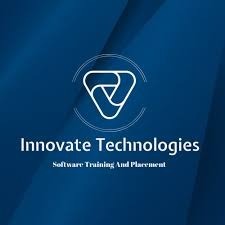
0 notes
Text
Master Full Stack Development with 100% Placement Assurance
Are you looking to kickstart a rewarding career in the tech industry? Full Stack Development is one of the most in-demand skills in the software industry today. With businesses increasingly relying on digital solutions, the demand for skilled Full Stack Developers continues to grow. Our Full Stack Development training program offers hands-on experience, expert guidance, and 100% placement assurance to help you secure a promising career in the IT field.
Why Choose Full Stack Development?
Full Stack Development involves working with both front-end and back-end technologies, making it a versatile and highly sought-after skill set. Here’s why you should consider becoming a Full Stack Developer:
High Demand – Companies are actively seeking professionals with Full Stack Development expertise.
Lucrative Salary – Full Stack Developers earn competitive salaries worldwide.
Diverse Career Opportunities – Work in startups, MNCs, or as a freelancer.
Complete Skillset – Gain knowledge in front-end, back-end, databases, and deployment.
What Our Training Program Offers
Our Full Stack Development training program is designed to equip you with job-ready skills. Here’s what you get:
1. Comprehensive Curriculum
Front-End Technologies: HTML, CSS, JavaScript, React.js
Back-End Technologies: Node.js, Express.js
Database Management: MongoDB, MySQL
Version Control: Git, GitHub
Deployment & Cloud Technologies: AWS, Firebase
2. Hands-On Projects
Gain practical experience by working on real-world projects that enhance your portfolio and showcase your skills to potential employers.
3. Expert Mentorship
Learn from industry experts with years of experience in Full Stack Development. Get guidance, support, and insights into industry trends.
4. Placement Assistance
We provide 100% placement assurance, including:
Resume building and interview preparation
Mock interviews with industry professionals
Job referrals and networking opportunities
5. Modern Infrastructure
Our institute offers state-of-the-art classrooms with modern infrastructure to ensure an immersive and productive learning experience.
Who Can Join This Course?
Our Full Stack Development training is suitable for:
Fresh graduates looking to enter the IT industry
Working professionals aiming for a career transition
Entrepreneurs wanting to develop their own web applications
Anyone passionate about coding and software development
Enroll Today & Secure Your Future!
Take the first step toward a successful career in Full Stack Development. Join our training program and get placed in top IT companies with 100% placement assurance.
For more details, contact us today!
Fullstack course in chennai
Fullstack developer course in chennai
Fullstack training in chennai

0 notes
Text
What is important to learn in web development?
1. Front-End Development (Client-Side)
HTML – The foundation of web pages.
CSS – Styling for layout, colors, and animations.
JavaScript – Adds interactivity and functionality.
Front-End Frameworks/Libraries:
React.js (Popular for modern web apps)
Vue.js or Angular (Alternatives to React)
Responsive Design – Ensuring websites work on all devices.
Version Control (Git/GitHub) – Tracking code changes.
2. Back-End Development (Server-Side)
Programming Languages:
JavaScript (Node.js)
Python (Django, Flask)
PHP (Laravel)
Java (Spring Boot)
Databases:
SQL (MySQL, PostgreSQL)
NoSQL (MongoDB, Firebase)
Authentication & Security:
JWT, OAuth, or session-based authentication.
Secure coding practices (preventing SQL Injection, XSS, etc.).
APIs:
RESTful APIs & GraphQL.
3. Full-Stack Development
Combining front-end and back-end skills.
Working with full-stack frameworks like MERN (MongoDB, Express.js, React, Node.js) or MEVN (Vue instead of React).
4. DevOps & Deployment
Hosting & Deployment:
Platforms like Netlify, Vercel, Firebase for front-end.
AWS, DigitalOcean, or Heroku for back-end.
Docker & Kubernetes – For scalable applications.
CI/CD (Continuous Integration/Continuous Deployment) – Automating code deployment.
5. Soft Skills & Best Practices
Problem-solving & debugging.
Understanding UX/UI principles.
Writing clean, maintainable code.
Working with Agile methodologies.
Since you’re associated with a Full Stack Development training institute, these topics can help shape your course offerings or promotional content.
Fullstack course in chennai
Fullstack developer course in chennai
Fullstack training in chennai

0 notes
Text
Full Stack Developer: The Most Versatile Role in Tech Today
In the fast-paced world of technology, few roles embody versatility and adaptability as much as the full stack developer. These tech professionals seamlessly navigate the complexities of both frontend and backend development, making them indispensable assets in the modern software development lifecycle. Let’s explore what makes full stack developers the most versatile role in tech today.
The Dual Nature of Full Stack Development
Full stack developers are unique in their ability to manage both the user-facing side (frontend) and the server-side logic (backend) of applications. This dual expertise enables them to:
Build cohesive and efficient systems.
Bridge the gap between design and functionality.
Troubleshoot and optimize across the entire stack.
Why Full Stack Developers Are So Versatile
Comprehensive Skill Set: Full stack developers possess a diverse toolkit, including:
Frontend technologies like HTML, CSS, JavaScript, and frameworks such as React or Angular.
Backend expertise in Node.js, Python, Ruby, or Java, along with frameworks like Express.js or Django.
Knowledge of databases, both SQL (MySQL, PostgreSQL) and NoSQL (MongoDB).
Adaptability Across Projects:
They can step into various roles, whether it’s enhancing the user experience or improving server performance.
Their understanding of the full development cycle allows them to pivot between tasks seamlessly.
Cost-Effective Talent:
For startups and small businesses, hiring a single full stack developer can be more budget-friendly than employing separate frontend and backend teams.
Their ability to manage end-to-end development reduces the need for multiple specialists.
Problem Solvers:
Full stack developers excel at troubleshooting issues that span both frontend and backend systems.
Their holistic perspective enables them to identify and address root causes effectively.
The Evolving Role of Full Stack Developers
As technology advances, the responsibilities of full stack developers continue to expand:
Integration of Emerging Technologies: They are at the forefront of integrating AI, machine learning, and IoT into applications.
Cloud-Native Development: Mastery of platforms like AWS, Azure, and Google Cloud allows them to build scalable, cloud-based solutions.
DevOps Practices: Increasingly, full stack developers are involved in deployment, automation, and CI/CD pipelines.
Skills That Set Full Stack Developers Apart
To thrive in this versatile role, developers need:
Technical Expertise:
Proficiency in multiple programming languages and frameworks.
Knowledge of API design and implementation (REST, GraphQL).
Soft Skills:
Strong communication to collaborate with cross-functional teams.
Problem-solving abilities to tackle complex challenges.
Continuous Learning:
Staying updated on industry trends and new technologies is vital to remain competitive.
The Future of Full Stack Development
The demand for full stack developers shows no signs of slowing down. As businesses increasingly rely on digital solutions, these versatile professionals will play a crucial role in:
Accelerating development timelines.
Creating seamless and intuitive user experiences.
Driving innovation in software and application design.
Conclusion
Full stack developers are the ultimate tech generalists, capable of wearing multiple hats and delivering results across the entire development lifecycle. Their versatility makes them indispensable in today’s tech-driven world. For those considering a career in technology or looking to upskill, full stack development offers a dynamic and rewarding path filled with opportunities for growth and impact.
Fullstack course in chennai
Fullstack developer course in chennai
Fullstack training in chennai
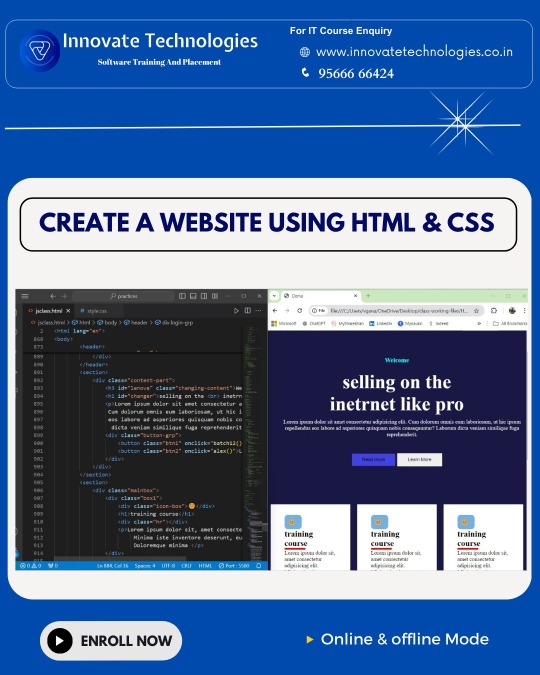
0 notes
Text
Is Upgrad data science course worth it?
Determining whether a specific course, such as Upgrad's data science program, is worth it depends on various factors, including your individual learning style, career goals, budget, and the course content itself. Here are some factors to consider when evaluating the worthiness of Upgrad's data science course or any similar program:
Course Content: Look into the syllabus and curriculum of the course. Does it cover the topics you want to learn about? Is the material up-to-date and relevant to the current industry standards?
Quality of Instructors: Research the instructors who will be teaching the course. Are they experienced professionals in the field of data science? Do they have a track record of successful teaching and industry experience?
Student Reviews and Feedback: Seek out reviews and feedback from past students who have taken the course. What did they think about the quality of instruction, course materials, and overall learning experience?
Industry Recognition and Accreditation: Check if the course is accredited by any reputable organizations or if it has partnerships with industry leaders. This can add credibility to the program.
Job Placement Support: Does the course offer any assistance with job placement or career services? This can be crucial, especially if you're looking to transition into a new career or advance in your current field.
Cost and Value for Money: Consider the cost of the course relative to what you will be getting in return. Compare it with similar programs offered by other institutions to determine if it offers good value for money.
Flexibility and Accessibility: Evaluate the course format and structure to see if it fits your schedule and learning preferences. Does it offer flexibility in terms of study hours and access to course materials?
Upgrad's Reputation: Research Upgrad as a company and its reputation in the field of online education. Have they been successful in providing quality courses and helping students achieve their learning goals?
Ultimately, whether Upgrad's data science course is worth it for you will depend on how well it aligns with your specific needs, goals, and preferences. It's a good idea to thoroughly research the program and perhaps even reach out to current or past students for their insights before making a decision.
Data science course in chennai
Data analytics course in chennai
Data science training institute in chennai

0 notes
Text
From Zero to Hero: How to Build a Career as a Full Stack Developer
The demand for full stack developers has skyrocketed in recent years as businesses increasingly seek professionals capable of handling both front-end and back-end development tasks. If you’re considering a career in this exciting and lucrative field, here’s a step-by-step guide to help you transition from a complete beginner to a seasoned professional.
Step 1: Understand the Role of a Full Stack Developer
A full stack developer works on both the client-side (front-end) and server-side (back-end) of a web application. They have expertise in:
Front-End Development: Crafting user interfaces using technologies like HTML, CSS, and JavaScript.
Back-End Development: Managing servers, databases, and application logic using tools like Node.js, Python, or Ruby on Rails.
Databases: Working with relational (SQL) and non-relational (NoSQL) databases such as MySQL, PostgreSQL, and MongoDB.
Step 2: Master the Basics
To lay a strong foundation, start with the basics of web development:
HTML & CSS: Learn how to structure and style web pages.
JavaScript: Understand core concepts like variables, loops, functions, and the Document Object Model (DOM).
Many free and paid resources, such as freeCodeCamp and Codecademy, can help you grasp these essentials.
Step 3: Learn Front-End Frameworks and Libraries
Once you’ve mastered the basics, dive into modern front-end tools:
Frameworks: React.js, Angular, or Vue.js to build dynamic user interfaces.
Version Control: Use Git and GitHub to manage your code and collaborate with others.
Step 4: Dive into Back-End Development
Developing back-end skills is crucial for becoming a full stack developer. Focus on:
Languages: Learn a back-end programming language like Python (Django/Flask), JavaScript (Node.js), or Ruby (Ruby on Rails).
APIs: Understand RESTful APIs and how to integrate them.
Authentication: Learn how to implement user authentication and authorization.
Step 5: Work with Databases
Databases store the data your application needs. Learn to:
Use SQL databases like MySQL and PostgreSQL.
Work with NoSQL databases such as MongoDB.
Optimize database queries for performance.
Step 6: Understand DevOps and Deployment
DevOps knowledge ensures your applications are properly deployed and maintained. Focus on:
Hosting Platforms: Familiarize yourself with cloud services like AWS, Heroku, and Netlify.
Containers: Learn Docker for consistent deployment.
CI/CD Pipelines: Automate deployment processes with tools like Jenkins or GitHub Actions.
Step 7: Build Real-World Projects
Apply your skills by creating real-world projects. Some ideas include:
A blog platform with user authentication.
An e-commerce site with a shopping cart.
A task management app.
Showcase these projects on a portfolio website and GitHub to impress potential employers.
Step 8: Stay Updated and Network
Technology evolves rapidly. Stay current by:
Following industry blogs and forums.
Participating in hackathons and meetups.
Joining online communities like Reddit’s r/webdev or Dev.to.
Networking can also help you discover job opportunities and learn from seasoned professionals.
Step 9: Prepare for Job Applications
When applying for jobs, make sure to:
Create a polished resume highlighting your projects and technical skills.
Practice coding challenges on platforms like LeetCode or HackerRank.
Prepare for technical interviews by reviewing common algorithms and design patterns.
Step 10: Embrace Continuous Learning
A full stack developer’s journey never truly ends. Regularly update your skills by:
Exploring new frameworks and libraries.
Learning about emerging technologies like AI and blockchain.
Enhancing your soft skills, such as communication and teamwork.
Fullstack course in chennai
Fullstack developer course in chennai
Fullstack training in chennai
0 notes
Text
Does full stack development have a future?
Yes, full stack development has a bright future in the tech industry, and its demand is expected to grow for several reasons. Here's a detailed exploration of why full stack development is and will continue to be a promising career path:
1. Increasing Demand for Versatile Developers
Companies are constantly seeking developers who can handle both front-end and back-end development to save costs and streamline collaboration.
Startups and small businesses, in particular, prefer hiring full stack developers who can take ownership of entire projects, from concept to deployment.
2. The Rise of Web and Mobile Applications
With businesses moving online and the demand for digital solutions skyrocketing, full stack developers are crucial for creating scalable and efficient web and mobile applications.
Technologies like React Native and Flutter allow full stack developers to work on cross-platform applications, enhancing their value in the market.
3. Agile Development Practices
Modern software development relies heavily on agile methodologies, which emphasize cross-functional teams.
Full stack developers, with their understanding of both ends of the stack, fit well into agile environments and contribute to faster development cycles.
4. Advancements in Technology
The emergence of new tools and frameworks (e.g., Next.js, Node.js, and MongoDB) continues to make full stack development more efficient and accessible.
Full stack engineers can quickly adapt to technological changes and leverage cutting-edge tools to deliver innovative solutions.
5. Growing Popularity of SaaS and Cloud-Based Applications
The software-as-a-service (SaaS) model is dominating the industry, and full stack developers play a vital role in building and maintaining these applications.
Skills in cloud technologies (AWS, Azure, Google Cloud) further enhance the relevance of full stack developers in building scalable systems.
6. Opportunities in Freelancing and Entrepreneurship
Full stack development skills are highly valued in the freelancing market, where clients look for developers who can deliver end-to-end solutions.
For aspiring entrepreneurs, full stack development provides the technical foundation to build and launch products independently.
7. Remote Work Compatibility
The COVID-19 pandemic and the rise of remote work have increased the demand for versatile developers who can work independently and handle multiple aspects of a project.
Full stack developers are well-suited for remote roles due to their broad skill set and ability to collaborate effectively across distributed teams.
8. Integration with Emerging Technologies
Full stack developers are increasingly involved in projects involving:
Artificial Intelligence (AI) and Machine Learning (ML): Integrating AI/ML capabilities into applications.
Internet of Things (IoT): Building full-stack solutions for connected devices.
Blockchain: Developing decentralized applications with both front-end interfaces and smart contract integration.
9. Continuous Learning Opportunities
Full stack development inherently involves learning a wide range of technologies, making it a dynamic and exciting career path.
Developers who enjoy solving diverse challenges and staying updated with the latest trends will find this field rewarding.
Challenges and How to Overcome Them
While full stack development has a promising future, it comes with challenges such as:
Staying Updated: Keeping up with rapidly evolving technologies can be overwhelming. Continuous learning and specialization in one area while maintaining broad knowledge are key.
Burnout Risk: Being responsible for the entire stack can be demanding. Effective time management and collaboration can mitigate this.
Conclusion
The future of full stack development is secure, with vast opportunities across industries and sectors. As businesses increasingly rely on digital solutions, the role of full stack developers will continue to grow in importance.
Whether you're just starting or looking to advance your career, investing in full stack development skills offers significant long-term benefits and a wealth of career options.
FULLSTACK COURSE IN CHENNAI
FULLSTACK DEVELOPER COURSE IN CHENNAI
FULLSTACK DEVELOPMENT COURSE IN CHENNAI
FULLSTACK TRAINING IN CHENNAI
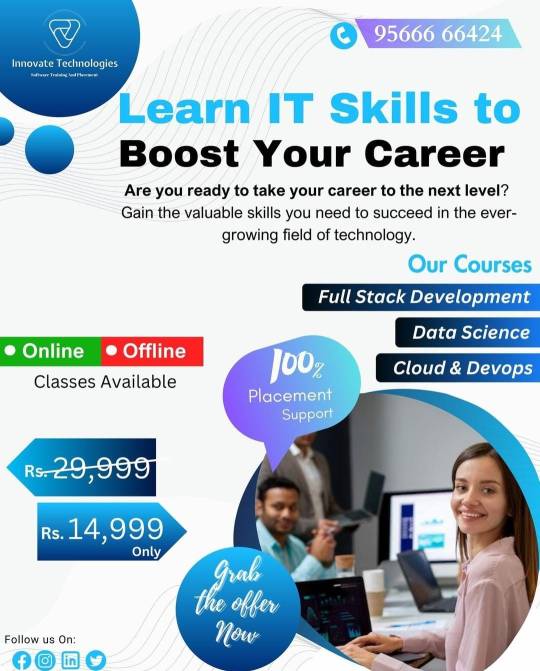
0 notes
Text
The Complete Data Science Course: Python, AI, and Machine Learning
Data science is revolutionizing industries, driving innovation, and powering decision-making through data-driven insights. This comprehensive course focuses on equipping you with the skills to harness the power of Python, Artificial Intelligence (AI), and Machine Learning (ML)—the pillars of modern data science. Whether you’re a beginner or an experienced professional, this guide will help you master the tools, techniques, and real-world applications of data science.
What You'll Learn
1. Python for Data Science: The Foundation
Python is the go-to programming language for data science due to its simplicity and powerful libraries.
Libraries You’ll Master:
NumPy: For numerical computations.
Pandas: For data manipulation and analysis.
Matplotlib & Seaborn: For data visualization.
Scikit-learn: For machine learning algorithms.
Key Concepts Covered:
Data cleaning and preparation.
Exploratory data analysis (EDA).
Writing efficient, reusable code for data workflows.
💡 Hands-On Projects: Analyze real-world datasets, like stock prices or social media trends, using Python.
2. Machine Learning: Building Predictive Models
Machine learning is at the heart of data science, enabling computers to learn patterns and make predictions.
Supervised Learning: Learn algorithms like linear regression, decision trees, and random forests.
Unsupervised Learning: Explore clustering, dimensionality reduction, and association rules.
Deep Learning: Gain an introduction to neural networks and frameworks like TensorFlow and PyTorch.
Steps to Build ML Models:
Data preprocessing and feature engineering.
Training and evaluating models.
Fine-tuning hyperparameters for optimal performance.
💡 Hands-On Projects: Predict housing prices, classify emails, or identify fraud using machine learning algorithms.
3. Artificial Intelligence: Beyond Machine Learning
Artificial Intelligence takes data science to the next level by simulating human intelligence.
Key AI Techniques:
Natural Language Processing (NLP): Analyze text data (e.g., sentiment analysis).
Computer Vision: Interpret images and videos (e.g., facial recognition).
Reinforcement Learning: Optimize decision-making through feedback.
💡 Hands-On Projects: Create a chatbot, image classifier, or sentiment analyzer using AI techniques.
Real-World Applications
Healthcare: Predict patient outcomes or automate medical imaging analysis.
Finance: Optimize investment strategies and detect fraud.
E-commerce: Personalize recommendations and improve customer experience.
Transportation: Power autonomous vehicles and optimize logistics.
Who Should Take This Course?
Beginners: No prior coding experience is necessary; start from scratch.
Data Enthusiasts: Build a solid foundation in data science.
Professionals: Transition to a data-driven career with practical skills.
Why Choose This Course?
Comprehensive Curriculum: Covers Python, ML, and AI from basics to advanced levels.
Practical Learning: Engage in real-world projects and case studies.
Industry Relevance: Gain skills in demand across industries.
Conclusion
With Python, AI, and Machine Learning, you’ll unlock the potential of data science to solve complex problems and innovate in any field. By the end of this course, you’ll be equipped with the expertise to tackle real-world challenges and excel in a data-driven world.
💻 Start your journey today and transform your career with data science!
Data science course in chennai
Data training in chennai
Data analytics course in chennai
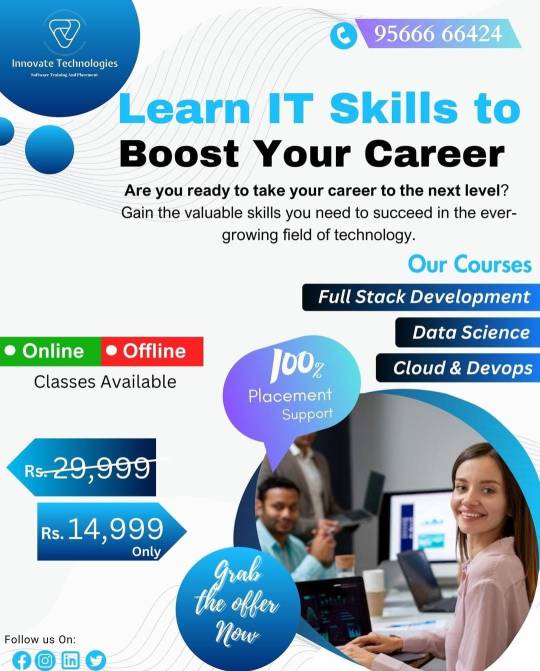
0 notes
Text
Does full stack development have a future?
Yes, full stack development has a bright future in the tech industry, and its demand is expected to grow for several reasons. Here's a detailed exploration of why full stack development is and will continue to be a promising career path:
1. Increasing Demand for Versatile Developers
Companies are constantly seeking developers who can handle both front-end and back-end development to save costs and streamline collaboration.
Startups and small businesses, in particular, prefer hiring full stack developers who can take ownership of entire projects, from concept to deployment.
2. The Rise of Web and Mobile Applications
With businesses moving online and the demand for digital solutions skyrocketing, full stack developers are crucial for creating scalable and efficient web and mobile applications.
Technologies like React Native and Flutter allow full stack developers to work on cross-platform applications, enhancing their value in the market.
3. Agile Development Practices
Modern software development relies heavily on agile methodologies, which emphasize cross-functional teams.
Full stack developers, with their understanding of both ends of the stack, fit well into agile environments and contribute to faster development cycles.
4. Advancements in Technology
The emergence of new tools and frameworks (e.g., Next.js, Node.js, and MongoDB) continues to make full stack development more efficient and accessible.
Full stack engineers can quickly adapt to technological changes and leverage cutting-edge tools to deliver innovative solutions.
5. Growing Popularity of SaaS and Cloud-Based Applications
The software-as-a-service (SaaS) model is dominating the industry, and full stack developers play a vital role in building and maintaining these applications.
Skills in cloud technologies (AWS, Azure, Google Cloud) further enhance the relevance of full stack developers in building scalable systems.
6. Opportunities in Freelancing and Entrepreneurship
Full stack development skills are highly valued in the freelancing market, where clients look for developers who can deliver end-to-end solutions.
For aspiring entrepreneurs, full stack development provides the technical foundation to build and launch products independently.
7. Remote Work Compatibility
The COVID-19 pandemic and the rise of remote work have increased the demand for versatile developers who can work independently and handle multiple aspects of a project.
Full stack developers are well-suited for remote roles due to their broad skill set and ability to collaborate effectively across distributed teams.
8. Integration with Emerging Technologies
Full stack developers are increasingly involved in projects involving:
Artificial Intelligence (AI) and Machine Learning (ML): Integrating AI/ML capabilities into applications.
Internet of Things (IoT): Building full-stack solutions for connected devices.
Blockchain: Developing decentralized applications with both front-end interfaces and smart contract integration.
9. Continuous Learning Opportunities
Full stack development inherently involves learning a wide range of technologies, making it a dynamic and exciting career path.
Developers who enjoy solving diverse challenges and staying updated with the latest trends will find this field rewarding.
Challenges and How to Overcome Them
While full stack development has a promising future, it comes with challenges such as:
Staying Updated: Keeping up with rapidly evolving technologies can be overwhelming. Continuous learning and specialization in one area while maintaining broad knowledge are key.
Burnout Risk: Being responsible for the entire stack can be demanding. Effective time management and collaboration can mitigate this.
Conclusion
The future of full stack development is secure, with vast opportunities across industries and sectors. As businesses increasingly rely on digital solutions, the role of full stack developers will continue to grow in importance.
Whether you're just starting or looking to advance your career, investing in full stack development skills offers significant long-term benefits and a wealth of career options.
FULLSTACK COURSE IN CHENNAI
FULLSTACK DEVELOPER COURSE IN CHENNAI
FULLSTACK DEVELOPMENT COURSE IN CHENNAI
FULLSTACK TRAINING IN CHENNAI
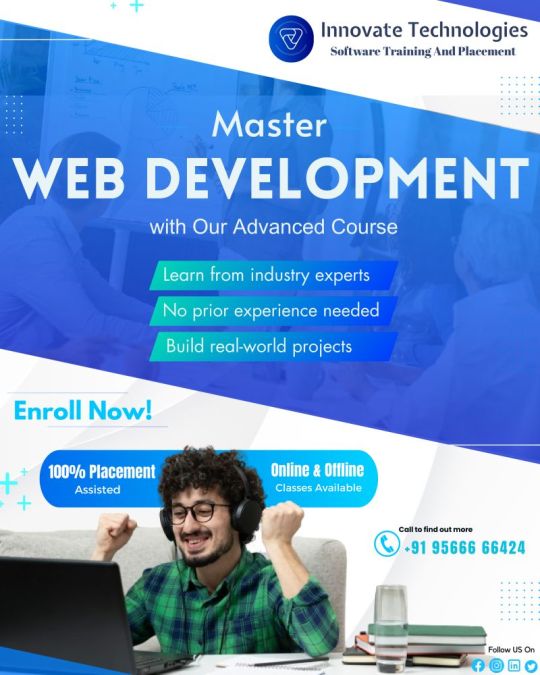
The tech industry in 2025 is booming, and full stack developers in chennai are at the forefront of this digital transformation. Their versatility and ability to handle both frontend and backend development make them invaluable assets to businesses of all sizes. Let’s explore why full stack developers are in such high demand and the trends shaping their role.
The Growing Demand for Full Stack Developers
Full stack developers offer a unique combination of skills, enabling them to build and manage entire applications. This dual expertise is especially valuable in:
Startups and Small Businesses: Limited budgets mean companies need developers who can handle multiple aspects of development.
Enterprise Projects: Large-scale systems require cohesive collaboration between frontend and backend, a strength of full stack developers.
Digital Transformation: Companies in non-tech industries are digitizing operations, creating a surge in demand for web-based solutions.
Key Reasons Behind the Demand
Cost Efficiency:
Hiring a single full stack developer can reduce costs compared to employing separate frontend and backend specialists.
They can also streamline workflows, reducing project timelines and associated expenses.
Versatility and Flexibility:
Full stack developers can adapt to various roles, making them ideal for dynamic projects.
Their ability to understand the full scope of a project helps in identifying and resolving issues efficiently.
Rapid Growth in Web and App Development:
With the rise of e-commerce, SaaS platforms, and mobile apps, businesses need developers to build seamless, user-friendly interfaces and robust backends.
Emerging Technologies:
Full stack developers are playing a key role in integrating AI, machine learning, blockchain, and IoT technologies into applications.
Trends Driving Full Stack Development
The Rise of JavaScript Frameworks:
Frameworks like React, Angular, and Vue.js dominate frontend development.
Node.js continues to lead backend development, making JavaScript an all-encompassing language for full stack developers.
DevOps and Automation:
Full stack developers are increasingly involved in deployment and automation processes using tools like Docker, Kubernetes, and CI/CD pipelines.
Focus on User Experience (UX):
Companies prioritize responsive, intuitive, and accessible designs, blending the roles of frontend and backend development.
Remote and Hybrid Work Models:
Distributed teams need developers who can bridge gaps between frontend, backend, and DevOps seamlessly.
Cloud-Native Development:
Full stack developers are leveraging cloud platforms like AWS, Azure, and Google Cloud to build scalable and efficient applications.
Skills That Set Full Stack Developers Apart
To meet industry demands, full stack developers in 2025 need:
Proficiency in frontend technologies (HTML, CSS, JavaScript, frameworks like React).
Mastery of backend languages and tools (Node.js, Python, Java, databases like MongoDB and PostgreSQL).
Knowledge of cloud services, DevOps practices, and API integrations.
A strong foundation in soft skills such as teamwork, problem-solving, and communication.
The Career Outlook for Full Stack Developers
The demand for full stack developers is projected to grow exponentially, driven by:
The increasing need for digital solutions across industries.
Businesses’ preference for adaptable and cost-effective tech talent.
The expanding scope of technologies like AI, IoT, and blockchain.
Conclusion
Full stack developers are the backbone of modern software development, bridging the gap between design and functionality. As businesses continue to innovate and digitize, the demand for skilled full stack developers in chennaiwill only grow. By staying updated on industry trends and continuously honing their skills, developers can seize exciting opportunities in this dynamic field.
Fullstack course in chennai
Fullstack training in chennai
Fullstack developer course in chennai
0 notes